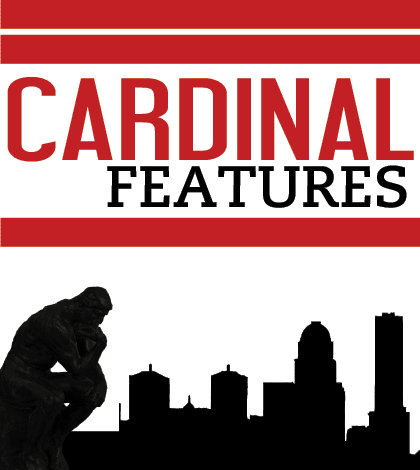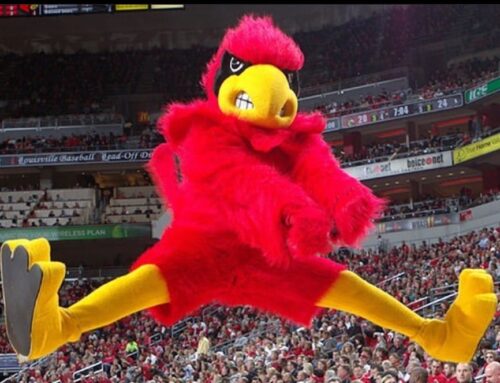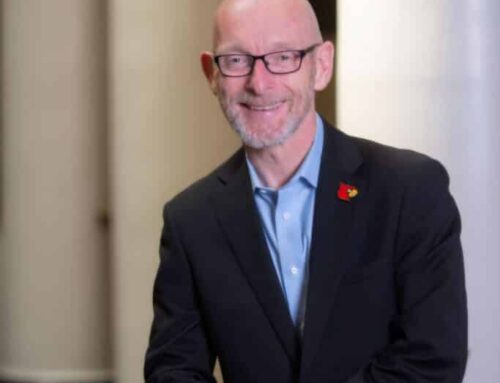By Madison Thompson–
The Gheens Science Hall and Rauch Planetarium is certainly one of the most unique buildings on campus. It is home to the Dome where fantastic light shows and fascinating shows about nature and our world take place. But many students aren’t familiar with the planetarium and all it has to offer.
TLC sat down with Tom Tretter, the director of the Rauch Planetarium since 2010, to get a behind-the-scenes look at the planetarium and what it takes to run it.
What does a normal day look like for you? What is it like being the director of the Planetarium? What tasks have to be done?
My tasks are quite varied. Some of the big strands of my work include reimagining and revising our K-12 programs so that they are tightly aligned with Kentucky science standards and the curriculum teachers are teaching in the schools. This is largely a summer-long task.
And lots of administrative tasks that aren’t very exciting – budget development, monthly financial paperwork and approvals, staff performance evaluations, strategic planning.
I also develop and deliver several special programs throughout the year to the general public. My staff and I are exploring the possibilities of using the planetarium dome as a venue to show virtual reality programming, with a goal of immersing the audience in the story.
We had a film festival earlier this month with some initial efforts along this line, including a short documentary focusing on an elementary-aged girl in Tanzania who walked miles each day to fetch water, went to school, then in evening walked miles again to find a place in a nearby town with electric lights so she could see to do her homework. We went along on the walk virtually.
How did you get to U of L? Did you go to school here before?
I did not grow up in Louisville. I taught high school physics and mathematics in Gabon, Africa as a Peace Corps Volunteer, in South Carolina, in North Carolina and in Sudan, Africa at the American school there for kids of embassy families and multinational corporations.
After completing my doctorate in science education at UNC Chapel Hill, I interviewed for and accepted a position as science education faculty at U of L in 2004. I was interested in the environment of collaboration across education and the various science departments at U of L, as well as the strong relationships U of L has with the various K-12 school systems in the region.
How did you get to be the director?
When the planetarium became part of the College of Education and Human Development in 2006, my research interests in how K-12 students learn about and think about non-human scale phenomena in science (too big, too small, too fast, too slow – to directly experience) was a natural fit for exploring how a planetarium can help bring these sorts of science ideas to life.
So I worked closely with the prior director in terms of programming and some small-scale research studies on student learning of science in a planetarium. Then in 2010 when that director moved to NOVA educational television position in Boston, the Dean of the College of Education and Human Development asked me to be the director since my work was most closely associated with the planetarium as a learning environment.
What else do you do for or with the university? I saw that you have several published books out.
My primary position is as a professor of science education, so I do a lot of research related to how students learn science, K-12 but also some research into undergraduate student learning, which includes in a planetarium setting but also research outside of the planetarium context.
I also teach, including both U of L students learning to become science teachers for our K-12 schools, and doctoral students who are sometimes interested in pursuing research faculty positions in higher education after their doctoral degree.
As part of that work, I work closely with our local K-12 districts in JCPS, OVEC and the Archdiocese of Louisville schools.
I also have been working closely with the Kentucky Department of Education related to new science standards adopted just two years ago, helping to co-facilitate a three-year professional development project – monthly day-long workshops plus two weeks in summer – with about 60 science teacher leaders from 14 districts in the region.
I also am the director of the Center for Research in Mathematics and Science Teacher Development, which is a center that conducts and supports faculty in a number of research projects related to science education and mathematics education.
Where are you originally from?
I grew up on a beef cattle farm about one and a half hours away from Louisville in Indiana, near the Holiday World amusement park. In fact, as a high school student I had a summer job for a couple of years operating rides at Holiday World.
What did you attend college and what was your major?
I have a bachelor of science degree in electrical engineering and minor in mathematics from Rose-Hulman Institute of Technology in Terre Haute, Indiana and a master of science degree in electrical engineering from California Institute of Technology in Pasadena, California.
After those degrees, I joined the Peace Corps as a high school mathematics teacher in Gabon, Africa, and loved it enough that upon return to the United States I became a high school mathematics and physics teacher for a decade before pursuing my doctorate in science education at UNC Chapel Hill.
What did you bring from past jobs to the directorship at the Planetarium? What are some good skills to keep with you?
Knowledge of how people learn, and how to develop curriculum, in this case taking advantage of the visual immersion in a dome, is central to my work as an effective planetarium director since we are an academic planetarium, which for us means we develop a lot of programming for specific audiences.
My background in science has also been very helpful, as has my engineering background given the high tech nature of the planetarium venue and the need to work closely with my technical coordinator to be sure we are up-to-date and effectively functioning year-round.
What do you like to do in your free time?
I enjoy being outdoors, particularly tent camping and hiking. Post Peace Corps, I spent about five months hiking different parts of southern Africa – Zimbabwe, Botswana, South Africa, Lesotho – with a backpack, tent and a thumb. That was many years ago, so now my outdoor hiking is more tame, but still enjoyable.
What are your goals and hopes for the Planetarium?
I continue to be interested in research projects exploring how the planetarium can best be used to support student learning in school, and how to develop a financial model that supports this mission (we are expected to pay for all our own costs through revenue we generate).
There has been a historical stance that something like a planetarium is a nice extra that kids enjoy and remember, but I don’t think the full educational value has been realized or fully appreciated. A planetarium offers a unique environment that I’d like to explore for learning for all kinds of people – K-12 students, university students, general public.
My hope is that the Louisville community continues to see our planetarium as a vibrant part of the Louisville fabric.
Do you have a favorite film/show for the Planetarium?
No favorites really – I enjoy when others are having a good experience.
How do you select the shows that will be shown next? Is there some sort of process?
If we are seeking a new show to support our K-12 science programming, I look for alignment with both current science topics and the school curriculum. I have experienced educators who deliver most of that programming, and they are able to help young students see the connections through the live portions of the presentations.
If seeking something for general public, I seek something with high current interest and that does a nice job telling the story in accessible ways. I have a 20-member community advisory board composed of a number of Louisville professionals in a range of fields who help in a number of ways, including advising on things like new shows.
How can students get involved if they want to volunteer at the Planetarium?
They can go to our website and find contact information at the bottom of our homepage, and send an email indicating interest and time available.
We hire a number of U of L work-study students on a regular basis for tasks throughout the year. We also sometimes have special events where we seek volunteers and our summer programs, if you are in town then, also include volunteers when available.
What is your favorite feature of the Planetarium?
My favorite physical feature is the dome itself. Just walking in, people often have a feeling of being transported to a different place and the 55-foot dome enclosing you heightens anticipation for what might happen.
Are there shows over the summer?
We have a regular schedule of shows Friday evening, Saturday evening and some Sundays that includes a variety of planetarium shows and laser/light shows such as Led Zeppelin and Pink Floyd that happen year-round.
Can you give any sneak previews for what might be coming in the future?
We have recently acquired and begun showing “Supervolcanoes” as part of our regular Friday/Saturday showings on a rotating basis, so you might be interested, particularly if you’ve been to Yellowstone National Park.
There is an upcoming special talk, “Pluto in Focus,” on May 15 as part of our Astronomy Day celebration that will highlight what we are learning about that mysterious dwarf planet and its moons since the first-ever spacecraft visit this past July.
And there will certainly be some special programming around the August 2017 total solar eclipse that will be seen right here in Kentucky. To keep up with what is happening, anyone is welcome to sign up via our website with your email to get a monthly newsletter with upcoming happenings.
Do you have a favorite quote or inspirational saying?
One of my favorite quotes came from the father of one of the elementary-aged children who participated in a week-long planetarium summer camp:
“My son gave you the ultimate compliment. He went into it [the camp] with a lot of questions in his mind he wanted to get answers to, but the thing he really liked was that by the end of each day he had a whole new slew of questions. It really made him think.”
Is there anything else you would like to say to inspire people to come and experience more at the Planetarium?
Imagine a place that puts you in the middle of experiences that engage your mind and your sense of wonder – and it’s all true. Well, except for the laser light shows – those are just for fun.
And you can come back again and again to eventually see all of our shows as many times as you like with a special-price annual membership for U of L students at $20 a year.
If you would like to go, don’t forget about the $6 BOGO (buy one, get one free) deal. With one student ID, you can get two tickets for only $6. If you want to stay for two shows or more, then you and a guest can get a $5 BOGO.
Times and schedules can be found online at planedarium.louisville.edu. You can also rent classrooms and even schedule birthday parties (usually for younger children). If you are interested in the light show but want to know what is playing, check the website for dates and playlists.





